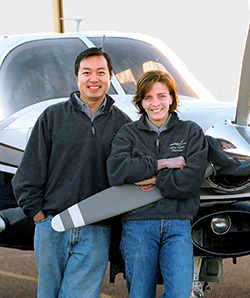HIGHLIGHTS:
E. Donald Shapiro Professor of Law; joined California Western in 2003
Executive Director, Institute of Health Law Studies; Co-Director & Adjunct Associate Professor of Anesthesiology, San Diego Center for Patient Safety, University of California, San Diego School of Medicine
J.D. Harvard University; M.D. Columbia University; Ph.D. University of Chicago; B.S. Massachusetts Institute of Technology
Courses Taught: Law, Medicine & Public Policy; Survey of Health Law
Profile Page: Bryan Liang

Can a law school influence the nation’s healthcare policies? Can it make hospitals safer for patients, expand minority access to healthcare, fight elder abuse, and help stop the import of dangerous fake drugs? It can if the law school is California Western and the man leading those efforts is Professor Bryan Liang, executive director of the Institute of Health Law Studies. As a physician, lawyer, and scholar, Liang has put California Western at the forefront of health law issues since arriving in 2003.
Liang's accomplishments were recognized recently when he was awarded the first E. Donald Shapiro Professorship, named for Dean Emeritus E. Donald Shapiro, a pioneer in the field of health law. The professorship is one of the school's six new California Heritage Professorships. These distinguished, endowed professorships recognize leading scholars who are making a significant contribution to the law school's research initiative.
There's probably no one in the nation more qualified than Liang to guide California Western in the complicated health law and health policy arenas. His education is one of his most potent and impressive tools: B.S. in chemistry from MIT, an M.D. from Columbia University, a Ph.D. in public policy from the University of Chicago, and a J.D. from Harvard Law School.
Liang's educational ambition was fueled by his parents, Chinese immigrants who came to America to escape the Communists. They instilled in their children a passion for excellence and hard work.
"I'm not even the smartest person in my own family," Liang laughs. "My father was a Ph.D. engineer and inventor who held over 200 patents and developed the first implantable lithium pacemaker battery. My brother is a physician and neuro-oncologist and my sister is a Berkeley-trained Ph.D. who developed software to translate the United Nations' databases into dozens of different languages."
In addition to teaching an introductory law class as well as courses on health law and medicine, Liang is co-director of the San Diego Center for Patient Safety at the UCSD School of Medicine, where he is an adjunct associate professor of anesthesiology. Liang also teaches at San Diego State University's School of Public Health.
"I was attracted to California Western because it offered me the best opportunity to focus on my four major areas of interest - research, advocacy, community service, and education. Thanks to the support of Dean Smith, my fellow faculty members, and our students, we've already accomplished some remarkable things in the past four years."
The list of what Liang has achieved is a tribute to his energy and drive. He's written five books and more than 200 articles on a range of health law and policy topics. He testified before Congress and helped write the national Patient Safety Act signed into law in 2005. He is one of the nation’s foremost experts on prescription and over-the-counter drug safety and is leading the effort to protect consumers against fake pharmaceuticals imported from China, India, and other countries.
In addition, Liang is a valued national media source and was recently quoted in healthcare stories in Business Week and U.S. News and World Report.
Liang is also fighting to expand minority access to healthcare, serving on the U.S. Department of Health and Human Services' Advisory Committee on Minority Health. He works with the San Diego County District Attorney's office to attack elder abuse and he volunteers his time to educate seniors in the community about patient rights and how to navigate the healthcare system.
"We need committed institutions like California Western to address all these issues because they’re incredibly complex, they're urgent, and they affect everyone's lives," Liang says. "But we're not only tackling these critical issues, we're having a major impact on them. By influencing health law and policies, we're making the system more efficient and more responsive. When we create programs and legislation that shake up the system, we're not just making healthcare safer and more accessible, we're actually saving lives. I don't know of any work more important than that."